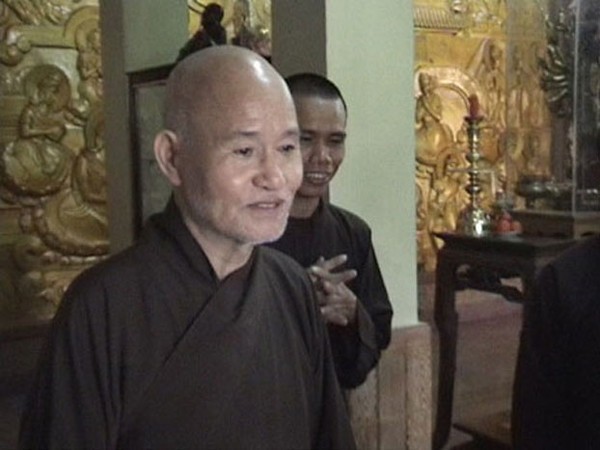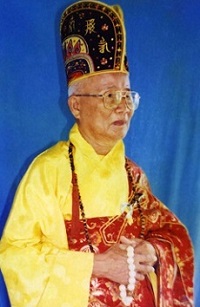PARIS, 6th June 2016 – (IBIB). The Most Venerable Thich Quang Do, Patriarch of the Unified Buddhist Church of Vietnam (UBCV) has issued his annual Message on the occasion of the Vesak (Birth of Buddha). In his Message, sent from the Thanh Minh Zen Monastery in Saigon where he is under effective house arrest, the UBCV Patriarch urged Buddhists to play the role of peacemakers in this era of global conflict, and be calatysts for democraric change in Vietnam.
“Today’s world is torn by natural and environmental disasters, but also by man-made horrors such as violence, terrorism and ruthless struggles for power. The presence of Buddhists, wherever they may be, should be a source of peace and conciliation amongst human beings”.
As history has proved, he observed, “Vietnamese people have an extraordinary, lasting power to be a catalyst of other forces. This power is characteristic of our nation, and also characteristic of Buddhism. For Buddhism is founded on the principles of Wisdom, Compassion and Courage. If our nation has survived periods of foreign annexation, it is thanks to our tolerance, our capacity to sift and select, our perseverance and will for self development.”
In Vietnam today, the Communist Party’s political monopoly excludes Buddhists and other large sectors of the population from participating in Vietnam’s development process, and as a result, the people are pressing for human rights, democracy and religious freedom. For Thich Quang Do, “Freedom of religion is the mother of all freedoms. When the people’s right to freedom of conscience is denied and their right to practice their spiritual beliefs is suppressed, then all other freedoms, such as free speech, press freedom, the right to form associations and to demonstrate become inaccessible”.
In celebration of the Vesak, Thich Quang Do urged the Communist leadership to “practice the teachings of tolerance and compassion taught by Lord Buddha” and “focus on protecting the nation’s sovereignty and ensuring the welfare of the whole 90 million population, rather than concentrating wealth and privileges in the hands of a ruling minority of four million Communist Party members.”
He called on the Buddhist Sangha to “deepen their spiritual practice”, “set aside their personal interests and petty self-centredness”, take “enlightenment and liberation as their ultimate goal, and the salvation of all beings as their sacred mission.”
His Message to all Buddhists was: “Open your hearts to Lord Buddha so that all pain and torment may be extinguished, and celebrate the Vesak as the Season to harvest Enlightenment.”
VESAK MESSAGE
On the Anniversary of the Birth of Buddha, Buddhist Era 2560 (2016)
by the Most Venerable THICH QUANG DO
Fifth Supreme Patriarch of the Unified Buddhist Church of Vietnam
Blessed be Lord Sakyamuni Buddha!
For almost three thousand years, the coming of the Vesak has filled the world with ineffable joy and illuminated the earth with the light of the Dharma, just as the full moon’s brightness dissipates the darkness of night.
On behalf of the Bi-Cameral Institutes of the Unified Buddhist Church of Vietnam, I extend my warmest greetings to all Buddhist elders, monks, nuns and Buddhists at home and abroad. May the pure and noble spirit of the Most Honoured One will be with us all on this joyful Vesak Day.
Open your hearts to Lord Buddha so that all pain and torment may be extinguished, and celebrate in the Vesak as the Season to harvest Enlightenment.
Today’s world is torn by natural and environmental disasters, but also by man-made horrors such as violence, terrorism and ruthless struggles for power. The presence of Buddhists, wherever they may be, should be a source of peace and conciliation amongst human beings. Since the end of the Cold War until today, people around the world have been waiting in hope for this harmony and concord to come.
The situation in Vietnam for the past forty-one years has prevented Buddhists and Vietnamese people overall from developing their national talents and true Buddha-nature, and from contributing these talents to help raise Vietnam to the level of other civilized nations and build a peaceful and moral society within their own homeland.
In 1970, in his Message “The Catalytic Way”, the late First Supreme Patriarch Thich Tinh Khiet voiced a painful truth when he said:
“The fact is that up to now, the Vietnamese people have never been allowed to speak their minds freely or realize their legitimate wishes. We Vietnamese, who love and cherish our country, should never allow anyone to misuse the people’s name for the sake of their own fame and profit, and pursue their aims of aggression and encroachment on our homeland.”
In an earlier Vesak Message in Buddhist Era 2513 (1969), Patriarch Thich Tinh Khiet made the following analysis:
“As history has proved, the Vietnamese people have an extraordinary, lasting power to be a catalyst of other forces. This power is characteristic of our nation, and also characteristic of Buddhism. For Buddhism is founded on the principles of Wisdom, Compassion and Courage. If our nation has survived periods of foreign annexation, it is thanks to our tolerance, our capacity to sift and select, our perseverance and will for self development. It is thanks to these precious qualities that Buddhism has more than once helped the nation to bring harmony between diverse schools of Oriental thought that advocated either “turning one’s back on life” or “engaging oneself in life’s affairs”, thereby creating a balance for Vietnamese thinking under the independent era of the Ly and Tran dynasties which spanned over three centuries (1010-1400). (…) In the on-going conflict between world ideologies, Vietnam has been chosen as a testing ground. What began as a clash of ideologies has now escalated into an atrocious, devastating war. When the war ends, it does not mean that the ideological conflict will end with it. On the contrary, this conflict will be more ferocious than before, unless we choose the “Catalytic Way”.
For many decades, the Vietnamese people, in particular the peasants, workers and religious followers of all denominations, have yearned desperately for human rights, democracy and religious freedom. Because they know that as long as these basic elements are not guaranteed, they have no chance of enjoying happiness and a reasonable standard of living, and their country can never match the development of its ASEAN neighbours.
Freedom of religion is the mother of all freedoms. When the people’s right to freedom of conscience is denied and their right to practice their spiritual beliefs is suppressed, then all other freedoms, such as free speech, press freedom, the right to form associations and to demonstrate, become inaccessible.
Since its creation in 1930, over the past 86 years, the Communist Party of Vietnam has held a monopoly of beliefs, expression and the press, especially since it took power over the whole country after the reunification of Vietnam. The more the Party’s doctrines are imposed, the more the people’s religions and views are suppressed. The more the Party’s dictates are absolute, the more the people’s right to life and expression are restricted, and gradually reduced to nothingness.
As we celebrate this Vesak Day and our religion of compassion and peace, we urge the leaders of the Communist Party to reconsider, and practice the teachings of tolerance and compassion taught by Lord Buddha. We urge them to focus on protecting the nation’s sovereignty and ensuring the welfare of the whole 90 million population, rather than concentrating wealth and privileges in the hands of a ruling minority of four million Communist Party members.
Respected Elders, Venerable monks, nuns and lay-followers at home and abroad,
To bring change, progress and peace to our homeland, I call upon each one of you to deepen your spiritual practice, just as the late Supreme Third Patriarch Thich Don Hau encouraged us with his parting words:
“The history of the spread of Buddhism in Vietnam and around the world has known times of tragedy and shame, but also glorious times of which we can be proud. The times of tragedy where when the Sangha’s essence was obscured, the Sangha were divided amongst themselves and followed different views; when their spiritual practice was in decline, and their perception of the Dharma was narrow and one-sided. On the other hand, the times of glory were those when the Sangha lived in harmony, when they set aside their personal interests and petty self-centredness to progress in their monastic life, taking enlightenment and liberation as their ultimate goal, and the salvation of all beings as their sacred mission.”
May the Most Honoured One protect us all.
Blessed be Sakyamuni Buddha.
Thanh Minh Zen Monastery,
Full moon of the Fourth Month, Year of the Monkey, 2016
Buddhist Era 2560
Fifth Supreme Patriarch
Unified Buddhist Church of Vietnam
(Signature and Seal)
Sramana THICH QUANG DO






1 Comment
NAM MÔ BỔN SƯ THÍCH CA MÂU NI PHẬT.
NAM MÔ VÔ ƯU THỌ HẠ BỔN SƯ THÍCH CA MÂU NI PHẬT.